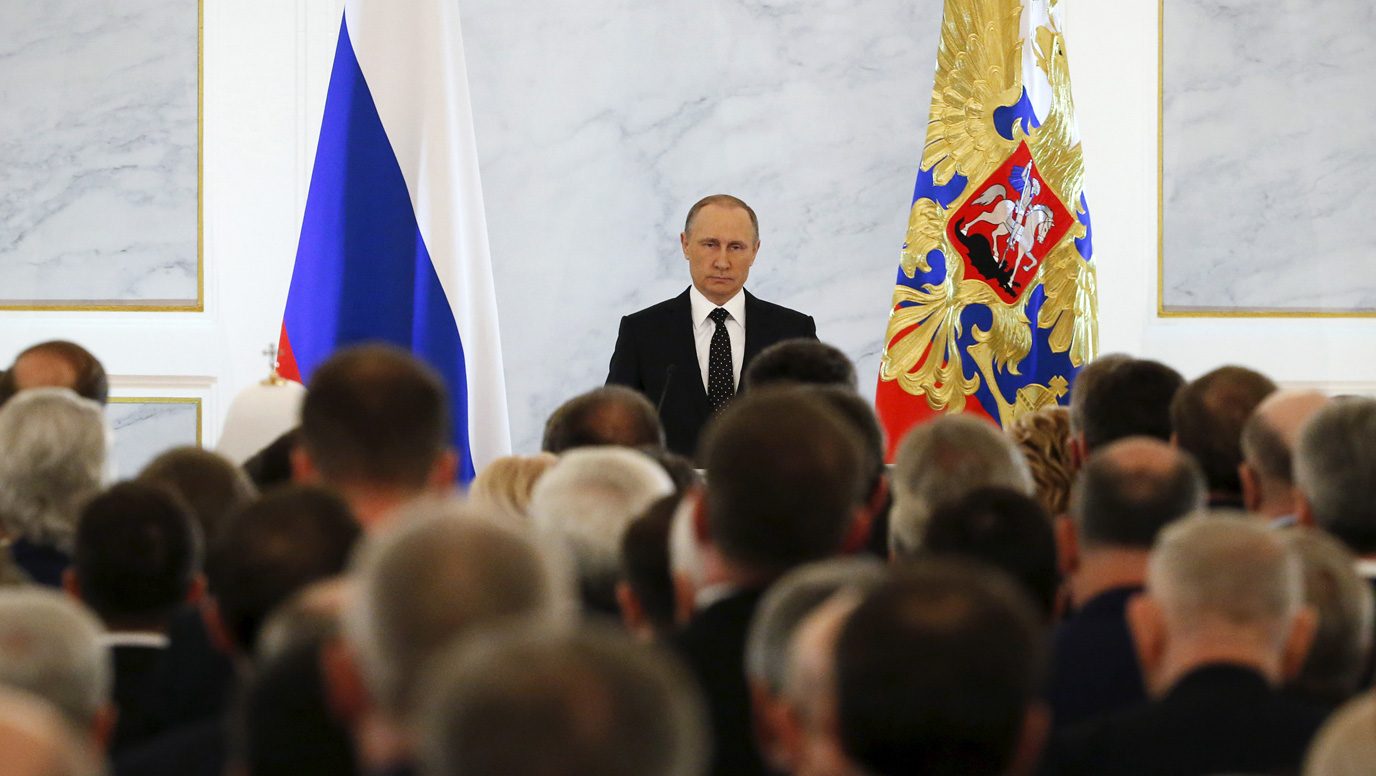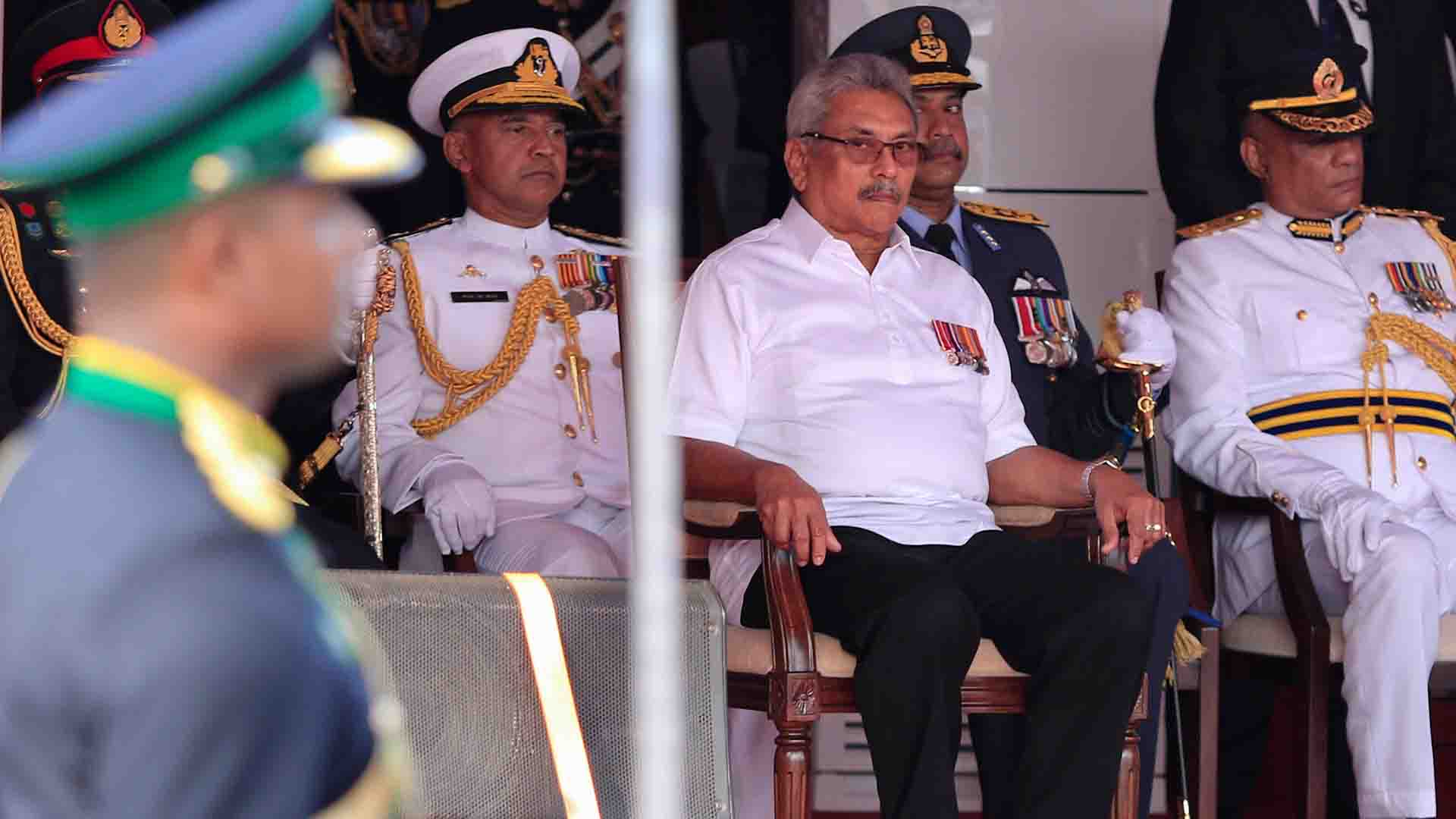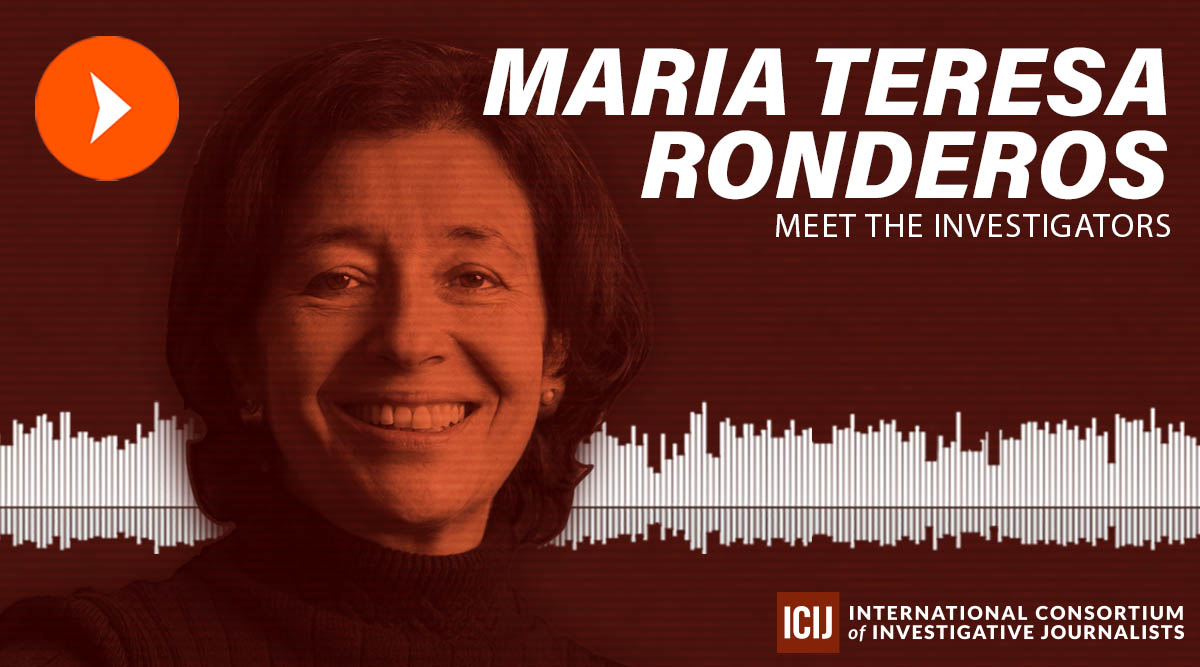MEET THE INVESTIGATORS
‘I can’t live without being able to ask questions and hold people accountable’
In this month’s episode of Meet the Investigators, we speak with Namini Wijedasa, deputy editor of investigations at The Sunday Times in Sri Lanka.
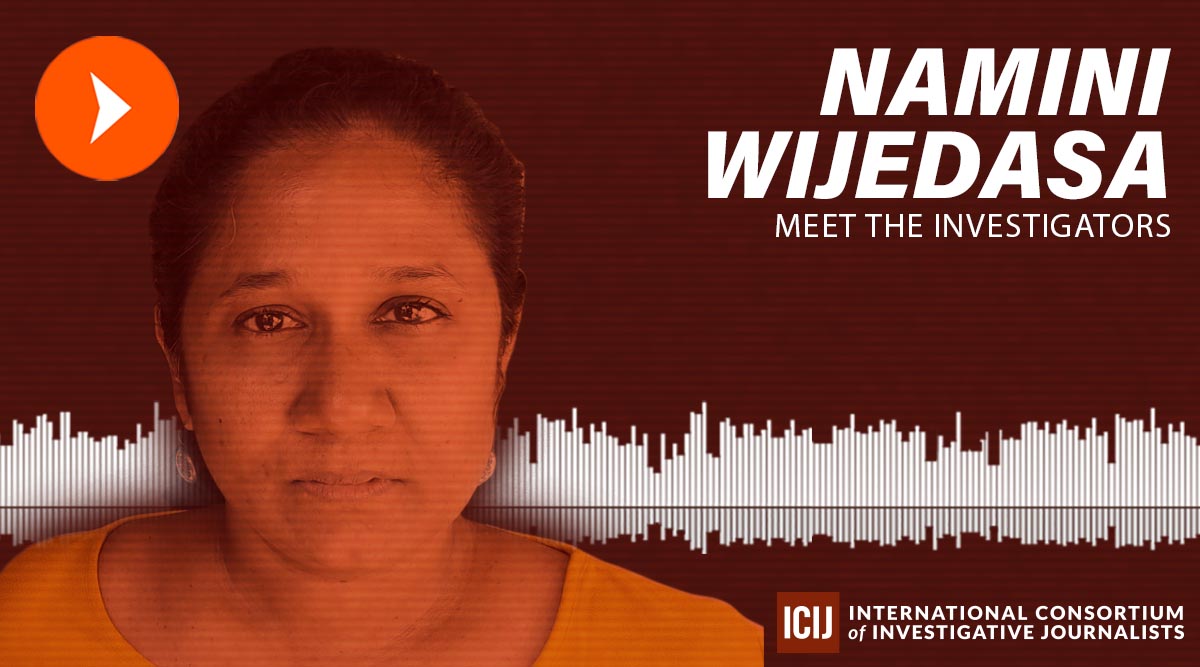
The International Consortium of Investigative Journalists collaborates with hundreds of members across the world. Each of these journalists is among the best in his or her country and many have won national and global awards. Our monthly series, Meet the Investigators, highlights the work of these tireless journalists.
Last month, we spoke with Namini Wijedasa, deputy editor of investigations at The Sunday Times in Sri Lanka. In her nearly 30-year-long career, Namini has covered a wide range of issues, from war to corruption. Sri Lanka routinely ranks low in global press freedom rankings and Namini has faced many threats to expose the truth and hold powerful people to account. She also mentors younger investigative reporters, teaching them how to go after hidden information while keeping a strong sense of ethics.
ICIJ’s award-winning Meet the Investigators series is emailed exclusively to ICIJ’s Insiders each month before being published on ICIJ.org, and is one of a number of ways we like to thank our community of supporters who are so integral to our independent journalism. You can join our Insiders community by making a donation to ICIJ. Thanks to all our ICIJ Members who have shared their stories with us, and to all our supporters for helping ICIJ continue its work.
TRANSCRIPT
Scilla Alecci: Hi, I’m Scilla Alecci with the International Consortium of Investigative Journalists and this is our podcast, Meet the Investigators.
In this series, we get to know the investigative journalists we work with every day at ICIJ.
We start the year of the tiger with (can I say it?) one of my favorite ICIJ members.
Namini Wijedasa: I’m Namini Wijedasa, and I am the deputy editor, investigations, of the Sunday Times in Sri Lanka.
Scilla: Namini got her start in journalism while she was still a teenager …
Namini: I was forced to go into journalism because I had problems at home. There was an advertisement in the newspaper. I had just turned 18 and I applied for it and went into it. At that time I was anyway good at writing and at English, but that’s not necessarily all you need for journalism.
I went into journalism with a sense of idealism, I think that door was inculcated in me by my family and that never died.
Scilla: When Namini joined the Sunday Times as a young reporter, it was 1994. Sri Lanka was in the middle of a brutal civil war, which pitted separatists from the Tamil minority against government troops.
Channel 4 Newscast: “… government forces systematiclly shelled hospitals with evidence that civilians sufferered rape, torture and execution. The Tamil Tiger rebels are also accused of using civilians as hostages and using child soldiers…”
Scilla: Namini kicked off her career as one of few women covering that ferocious conflict.
Namini: I went to war coverage very early in my life. I think in my early twenties, when newspaper offices were not really encouraging women to go out. Because I suppose they felt protective, maybe, of their women or there was a culture that only men would go out because there are so many men on the field.
A few of us fought that. I can very clearly remember fighting that in my office and I did start going out pretty early. And then sooner or later, it became quite normal to find women on the warfront. There would be organized visits sometimes, they would take us there, show us stuff and bring us back fast.
I would go in the morning on a military flight, take those risks and come back and not really even tell my parents. And at that time, it was pretty bad. There were suicide bombings all the time.
Scilla: The war ended in 2009, claiming a total of nearly 100,000 lives over three decades.
Namini: My intention in the war was not really [covering] the military action but it was to show how people are the same, because there was a divide between the Tamils and the Singhalese which still exist today.
But the more I went [to the warfront], the more I realized that grief is the same. You feel grief the same way. Death is the same. You feel death in the same way, you die in the same way.
The economic challenges you face, the depression you face, the uncertainty about tomorrow, everything is the same for people.
So my intention ー as I grew into war coverage ー was to show that to people, through my writing.
I can’t imagine not being able to do that: Not being able to pick up the phone and ask the questions that need to be asked or meet somebody and hold them to account.
Scilla: Why did you decide to become an investigative journalist?
Namini: I did many things over the years and, then, it just happened that none of those things challenged me enough. So I always wanted to dig deeper, and then came more awareness, even through the Internet, about what investigative journalism is. Because when I started out in 1994, we didn’t have the Internet.
And my sense of curiosity and justice never died, and investigative journalism was the perfect way to cater to that.
Investigations really thrill me because it’s information that is hidden. And for me, it’s a real challenge to dig and try to get people to open up. Even the psychology of interviews, even the assessment of people, on how to approach them, on what strategy will work best…
So, I happened into journalism by chance, but then I grew into it and I can’t imagine doing anything else.
Scilla: What’s the thing that you most like about it?
Namini: It’s just that, everyone … when you’re frustrated by what’s going on around you, you don’t have the chance to do anything about it.
But as a journalist, if there are questions out there that you see, for instance, nowadays on social media, you can actually pick up the phone and hold people to account. You can get the answers.
I can’t imagine not being able to do that: Not being able to pick up the phone and ask the questions that need to be asked or meet somebody and hold them to account. I might not always get the answers I want. But the ability to do so, I can’t live without it anymore.
Scilla: It was Namini’s perseverance that, in 2014, led her to a groubreaking investigation. She exposed how top Sri Lankan government officials paid more than $6 million to a Pakistani-American lobbyist named Imaad Zuberi to rehabilitate the country’s image after the war.
Namini: He was posing as a middleman between the government and U.S. lobbyists, and he took a lot of money from the Sri Lankan government because, at the time, they had just ended a brutal war and they wanted to really clean up the image in the U.S. And Imaad Zuberi came to Sri Lanka and they had stars in their eyes and they passed off $6 million to Imaad Zuberi and his wife just through the central bank. Most of the Cabinet ministers didn’t know. A lot of the country didn’t know ー except, the Sunday Times did report it but nobody cared. And in the end, $6 million was lost.
Scilla: The investigation was a joint collaboration between Namini at The Sunday Times and Bill Alison at Foreign Policy magazine. As a result, in 2021 a U.S, court sentenced the lobbyist to 12 years for hiding his identity as a foreign agent and other crimes.
Namini: This is the kind of thing, I think, investigative journalists want, because honestly there’s no money in this. People hate you. And the glory of it, like, when a story breaks, they think, ‘oh, that’s really great!’ But it’s short-lived unless there is an impact. And this is what we’ve all been fighting for in investigative journalism.
Scilla: Can you tell me more about this investigation? Did you use a particular technique, or anything that helped you get the story?
Namini: It’s not a technique I used. The source was pure luck, to be honest. The government had just changed. The person I asked I had known for awhile, and he came back into the administration. And he said: “Yeah. Sure, I’ll check and see if it’s there.”
And these documents that we needed to prove that money was sent to Imaad Zuberi were still at the central bank. They were among documents that were not destroyed.
So my source gave them to me and actually the sense of excitement I felt when I went through them, and I saw that there were telegraphic transfers and basically proof of money going, e-mails between these key players in that administration saying: “pass the money,” “pay the money,” all of those things…I just asked for it.
Bill [Allison] did a lot of work in the U.S. So, I was extremely lucky because he was very well connected with the Department of Justice and he’s a superb investigative journalist.
And I did my part here, which is basically analyze the numbers, look at all the documents… My interest was [to understand] how much money had we been spending. I analyzed all of it and I wrote about six stories just calculating, adding up, adding up, adding up and seeing just how much we had spent and on whom.
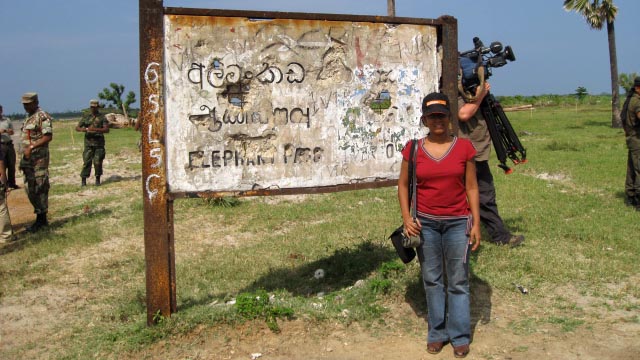
Scilla: Is it risky? Is it dangerous? How’s it being an investigative journalist who asks so many questions in Sri Lanka?
Namini: It depends always on who is in the administration, who is in the government. For instance, there was one administration here that introduced the right to information act after many, many years of campaigning, and they also went as far as to start proactive disclosure.
But then the government changed again. And there was a period of time when we didn’t really know what would happen to the right to information, whether they would repeal it, or whether they would weaken the commission. So when that sort of administration comes in you are living in uncertainty.
At the worst of times I had to encounter low-level intimidation. It didn’t go as far as assault or murder. But there were visits by intelligence officers to my home, to my street, asking pointed questions, and making sure it was conveyed to me that I knew that I was being watched. There was a time when many other journalists also had visits to their homes.
When they come to your home or to your parents’ home, it’s a completely different thing from, you know, stopping you on the street or coming to your office and questioning you. There’s a clear message, because it affects [your] family and they get very worried. And that’s one way of being able to shut us up because the pressure you face from family is often very high.
I faced that pressure too and I understand it. I understand the stress my husband was going through at the time, why he told me that if I don’t stop what I’m doing, ‘Just go, go away because it is affecting the children.’ So there have been times of extreme stress.
Scilla: And what do you do in those situations?
Namini: One thing that I have done over my career is always to stay in an institution. And I’ve been fortunate to have editors who can understand the threat and who support me.
And there are times when we do threat assessments, my editors and I. We do take up stories and think: ‘OK, do we do this? And what are the repercussions? Do we wait for a better time?’ The story doesn’t die. But sometimes, we have to wait until we’re able to tell it.
Something I was told, that my stepmother told me actually is that: “a dead journalist is of no use to anyone.” When I was taking too many risks. And that has stayed with me a lot.
So there are times when you go forward, more adventurous than other times, and there are times where you just draw back and wait for stuff to pass.
But things have changed because of social media, I must say, at least in Sri Lanka. Before social media became such a thing, we were very much alone. So we were identified targets, but now it’s coming at them ー the administration, any administration — it comes at them from multiple quarters.
So in a way, they actually value professional journalism more, because the attacks on them and the questions raised by social media apply far more pressure on them.
Scilla: Since the war ended, members of the Rajapaksa family, who were prominent government officials during the war, have dominated the country’s politics ー with the exception of a four year hiatus. Mahinda Rajapaksa, the former president is now prime minister. When, in 2019, his brother Gotabaya was elected president many journalists were on the alert.
Namini: The president, who was a defense secretary before during the time of the war, and he was known to be quite ruthless — now he’s far more accountable as president than he was as the Secretary of Defense, when he could do stuff and was basically a civil servant. Now, he’s the man at the top. And, also, they are very concerned about how social media treats them.
Another thing is that we have multiple crises, forget about the COVID19 [pandemic] … the fact that our economy is in almost utter distress. So, circumstances have maybe made it less dangerous than we thought it would be.
Scilla: For Namini, collaborating with other journalists has been a way to overcome the uncertainties surrounding press rights in her country.
Namini: I think collaboration also protects people like us. For instance, a story I’m working on now, if I did it alone by myself, it would be me and my institution having to face it. But then, if the other institution abroad, which has much wider reach and is far more well-known in the world, is also doing the same story, we can share that risk. You are not alone.
Information sharing and the brainstorming is just amazing. That’s been an incredible learning process because in Sri Lanka the capacity for investigative journalism is still growing, and that comes through people like us. And when people like us get to collaborate with journalists abroad, who have far more access and more training, we develop as the story progresses.
Even internally, when I started journalism, journalists wouldn’t share phone numbers. They were really protective, they wouldn’t share the name of their sources. Whereas now, in my office, we just shout out phone numbers (I mean, in a secure environment.) But we share everything because it shows that you can’t grow alone.
Scilla: Speaking of collaborations, Namini also worked on ICIJ’s latest investigation: The Pandora Papers, which involved 600 journalists worldwide. Based on a leak of about 12 million records, it exposed how the world’s ultra-rich and powerful use shell companies in tax havens to hide wealth and multiply their riches.
In Sri Lanka, the files unveiled details on the offshore holdings of Nirupama Rajapaksa, a former minister and a relative of the country’s current president, and her husband.
Newsfirst Sri Lanka Newscast: “…The ICIJ says they had used one company to buy luxury apartments in London and Sydney. According to the leak, Thirukumar Nadesan had set up a company to obtain consultancy contracts from foreign companies. These foreign companies had been doing business with the Sri Lankan government… Rajapaksa and Nadesan have declined to comment on the allegations…”
Scilla: People have known for years that some Sri Lankan politicians used shell companies to hide money or do business deals. But in this case, there were actual names of some prominent people in the leak. What’s the significance of this investigation, do you think?
Namini: It sort of vindicates what we’ve been saying, or hinting at all of these years, right? That there is corruption at the highest levels. What we didn’t have was evidence of it.
So, personally, you feel a sense of vindication because it’s a divisive sort of environment you’re working in. When you talk about some politician who might be corrupt and there are indications that certain things happened, like commissions or bribes changing hands, you get attacked by supporters of those people.
So here is the proof; here is proof that these things do happen. It doesn’t have to be a particular party. I mean in the Pandora Papers in Sri Lanka, we covered people from two parties and one of those parties was supposed to be very clean. One of the people was very close to the former administration, the immediate past administration, which was called “Good Governance Government.” And nobody really knew what he had been up to, until it was found in the Pandora Papers. Nobody knew.
Scilla: The leaked files also included information on Ramalingam Paskaralingam, also known as “Paski.” A top Sri Lankan bureaucrat for decades, Paski used shell companies to buy property in London and secretly finance a school in the outskirts of Colombo.
Namini: Just imagine, if we didn’t have this. If we didn’t have this kind of information coming out, the world would be such a useless place!
Scilla: Shortly after ICIJ and its media partners published the findings, last October, president Gotabaya Rajapaksa announced he’d set up a committee to investigate.
Namini: It’s very common for them to say: ‘the president has appointed a Committee or an investigative body in order to look further into the matter,’ and everyone’s applauding and saying ‘Oh. That’s great!’
Where’s the report?
There is no report; the bribery commission did nothing with it. The bribery commission has not caught any big fish ever, as far as I can tell. But plenty of cases went there, they just died a natural death.
I have spent a long time trying to analyze this nothing-happens-in-Sri-Lanka business because this is not the first time. There are times when I get extremely depressed about it, really depressed. I can feel it weighing down on me. And then I snap out of it because we still have to work. But the point is I’ve realized that everyone is corrupt here, everyone. So the systems are broken, the systems are corrupt.
This is the point where I think that Sri Lankan journalism has to become bigger and stronger.
But the fact is that investigative journalism is attractive to very few people. For some reason, one thing is that there’s fear. When young people enter journalism, the influence of families is very great. And ultimately, I found that a lot of journalists themselves get compromised.
Not necessarily by money but the fact that, in today’s world, “selfie journalism,” where the person becomes more important than the story, is really having a huge impact on how reporting is done.
Because you go to a press conference, for instance, with, say, important people, VIPs. You have people taking selfies and putting them up on Facebook, on social media to show they’ve been there. “I’ve been there” becomes the bigger story than going there and doing their job. Politicians and corrupt people know how to get you. Really, it doesn’t take much now.
I feel it’s a turning point, a transition. I feel old-fashioned in the way I’m doing stuff. But maybe we’ll go full circle, where we will go through this phase ー which is not very nice ー and come back to real journalism, I don’t know.
Scilla: You told me you train younger reporters as a part of your job. What do you teach them? What’s the advice you always give them?
Namini: I have three girls, incidentally mostly women that joined my desk. I’ve taught them to be honest, just just not to get carried away. I listen to them asking questions. I correct them in the manner they approach people. Every little thing that I can possibly teach them I do because I also have a feeling (maybe I’m fatalistic) that we don’t have much time on Earth to do what we have to do, and that we need to leave people behind.
We’re actually running on passion. It’s not money. It’s nothing else, it’s just the passion.
So what I’m trying to teach them is to be passionate about what they do, and never to lose the sense of idealism because I know we can’t have an ideal society. But we have to be able to aim at something.
[I teach them] to hold your head up high, don’t do the “selfie journalism” thing. Don’t be the story, tell the story. So many things that they need to absorb, but I’d be happy if they stay on. I’m not sure if they will.
Scilla: Let’s hope they do… with such a teacher!
Namini: I don’t want to come across like it’s all very rewarding and happy thing that we do…I don’t want them to think that it’s a miserable job either, but it’s just, it’s hard. But somebody’s got to do it. And if we’re not in the picture, I don’t think societies have a chance of improving or even functioning normally.
Scilla: You keep fighting!
Namini: Yeah, you too!
Scilla: That’s it for this episode of our Meet the Investigators podcast.
I hope you enjoyed it. Please send us your feedback at social@icij.org. And – don’t forget to tell your friends! If you can, please share it on social media and use the hashtag #MeetTheInvestigators.
Thanks for listening. Ciao!
If you’re a fan of our Meet the Investigators series, please consider making a donation to support ICIJ. Not only will your donation help support our work with journalists like Namini, but as an ICIJ Insider, you’ll also receive sneak previews, access to exclusive chats with reporters and behind-the-scenes content like this delivered straight to your inbox. Donate today, and support independent investigative journalism.
